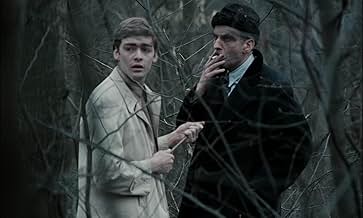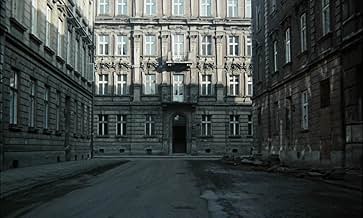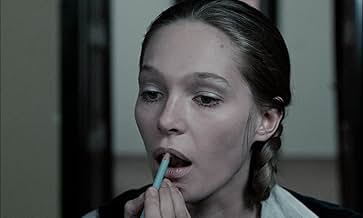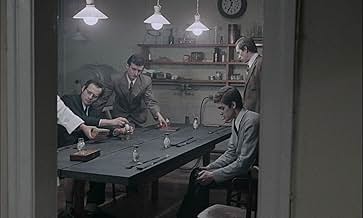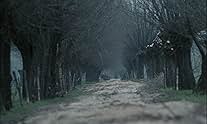IMDb RATING
7.3/10
3.1K
YOUR RATING
During Nazi occupation of WWII Poland, after his family's slaughter, a husband joins the resistance while hunted by Gestapo. He aids a woman in labor, works as a typhus vaccine guinea pig, a... Read allDuring Nazi occupation of WWII Poland, after his family's slaughter, a husband joins the resistance while hunted by Gestapo. He aids a woman in labor, works as a typhus vaccine guinea pig, and confronts a man tortured in his place.During Nazi occupation of WWII Poland, after his family's slaughter, a husband joins the resistance while hunted by Gestapo. He aids a woman in labor, works as a typhus vaccine guinea pig, and confronts a man tortured in his place.
- Director
- Writers
- Stars
- Director
- Writers
- All cast & crew
- Production, box office & more at IMDbPro
7.33.1K
1
2
3
4
5
6
7
8
9
10
Featured reviews
Surreal take on Nazi occupied Poland
The film jumps between time-lines and characters in a somewhat confusing manner with dead figures re-appearing throughout the film, so trying to give a detailed story-line is somewhat pointless. The dialogue is extreme and sometimes absurd, but that only adds to the atmosphere of a character being eaten by lice and perhaps in a fever. The lice thing is based on fact - Polish resistance fighters were happy to put themselves forward for scientific experimentation with lice (in an effort to eradicate typhoid), as no German soldiers would go near them if their cards said that they were involved in the programme. The lice in any case are a symbol of war - people sucking the blood out of each other etc. A chaotic and incoherent film, but amazing first-time direction from Zuwavski. It is all filmed in hand-held camera (usual stuff now, but extremely unusual back in the early 70's), so there is a lot of movement. The film was made in Krakow and the city looks nothing like is now - an empty desolate filthy city of dilapidated grey building. Very Kafka-esque indeed, with stark bleak colours. I liked the film for atmosphere and cinematics, but many will not if they concentrate on the story and often somewhat obscure dialogue.The film was a big thing when it came out in Poland with huge queues to see it by the public - it has lost its relevance today and looks VERY dated (ie. as does all Polish 1970s cinema), but is still an interesting view.
Life at the bottom of a chasm
The Third part of the night is set in Poland during the second world war, which, as you will probably know, was infested by the plague of Nazism, and latterly equipollent Communism. The film starts with a quotation from Revelations Chapter VIII, which delineates the havoc that will be wreaked upon the earth when the Big Guy decides it's time to wrap everything up. There are seven trumpets being blown, the first four we are told about, and they wreak chaotic damage to earth, generally in thirds: a third of the rivers are turned to wormwood, one third of ships destroyed... Anyway the fourth trumpet makes it so that for a third part of the night the moon and stars will not shine, so that's basically what the German occupation of Poland is, the Third Part of the Night.
Most of the film is set in the city of Lwow, which was then part of Poland, but now has been made part of Ukraine and is called Lviv. That was Joe Stalin's doing, part of his Polish Holocaust.
The film starts though in the countryside with a violent act that is a quotation of the violence at the start of Menilmontant if I have seen things correctly. Michal the main character, a ghost-faced unibrowed typhus sufferer loses his family and returns to Lwow, where he attempts to become part of the resistance. It turns out that the resistance centers around a research institute. The folks there exist to feed lice. The way it works is that you put a strap around your bare leg and slot in these matchbox size containers full of lice that feed from your blood through a wire mesh. These lice are used to breed typhus, and the vaccine is then prepared from their guts. One guy gets home from work, strips naked and starts scratching himself and whimpering. Not the most pleasant scene. Involving yourself in this process gave you great papers though, because the Germans took one look at your papers, and were then scared of catching typhus from you and so left you well alone.
After losing his wife, Michal comes across a woman who looks exactly like her (a plot device Zulawski also uses in La Femme Publique). It's not clear why this device is used, but it could be a misogynist motif, ie. he's incapable of seeing the woman for who she is, he may also be having a traumatic hallucination, which would mean that there is a woman but she doesn't look like his wife. This *hallucination* of a movie is mainly anchored around this plot, providing some sort of bearing for the viewer.
You won't see a normal moment in the entire movie, everything is topsy turvy, every scene is either in a shattered building, or of a normal building full of shattered people. It's a nightmarish movie, like a dance of death. Dance is an appropriate word because the film uses hand-held camera a lot (though Zulawski in an interview has stated that the cameraman he found had a very steady hand, and he was obviously proud to find him), and the shot dances around, with some circular shots, zooms you never see coming, really it's very alive.
What really is the Zulawski strength though is directing actors, he managed to coax scenes of incredible intensity out of Malgorzata Braunek (as Michal's wife) and Jerzy Golinski (Michal's father). I've seen almost nothing like it, though another Polish film springs to mind, Jerzy Kawalerowicz's Mother Joan of the Angels. The actors handed themselves over to Zulawski, giving them his complete trust, Braunek in particular in one scene at the institute connected with some deep innermost primal emotions.
The cellar shots at the institute are the bleakest shots you're likely to see in cinema, and remind me only of paintings, and bizarrely of the shots of test chambers in Alien 4.
The only big stumbling block for most people I believe would be the music, which is very out-of-place jazz (three quarters of the way between mellifluence and dissonance), and has taken me a while to get used to.
Most of the film is set in the city of Lwow, which was then part of Poland, but now has been made part of Ukraine and is called Lviv. That was Joe Stalin's doing, part of his Polish Holocaust.
The film starts though in the countryside with a violent act that is a quotation of the violence at the start of Menilmontant if I have seen things correctly. Michal the main character, a ghost-faced unibrowed typhus sufferer loses his family and returns to Lwow, where he attempts to become part of the resistance. It turns out that the resistance centers around a research institute. The folks there exist to feed lice. The way it works is that you put a strap around your bare leg and slot in these matchbox size containers full of lice that feed from your blood through a wire mesh. These lice are used to breed typhus, and the vaccine is then prepared from their guts. One guy gets home from work, strips naked and starts scratching himself and whimpering. Not the most pleasant scene. Involving yourself in this process gave you great papers though, because the Germans took one look at your papers, and were then scared of catching typhus from you and so left you well alone.
After losing his wife, Michal comes across a woman who looks exactly like her (a plot device Zulawski also uses in La Femme Publique). It's not clear why this device is used, but it could be a misogynist motif, ie. he's incapable of seeing the woman for who she is, he may also be having a traumatic hallucination, which would mean that there is a woman but she doesn't look like his wife. This *hallucination* of a movie is mainly anchored around this plot, providing some sort of bearing for the viewer.
You won't see a normal moment in the entire movie, everything is topsy turvy, every scene is either in a shattered building, or of a normal building full of shattered people. It's a nightmarish movie, like a dance of death. Dance is an appropriate word because the film uses hand-held camera a lot (though Zulawski in an interview has stated that the cameraman he found had a very steady hand, and he was obviously proud to find him), and the shot dances around, with some circular shots, zooms you never see coming, really it's very alive.
What really is the Zulawski strength though is directing actors, he managed to coax scenes of incredible intensity out of Malgorzata Braunek (as Michal's wife) and Jerzy Golinski (Michal's father). I've seen almost nothing like it, though another Polish film springs to mind, Jerzy Kawalerowicz's Mother Joan of the Angels. The actors handed themselves over to Zulawski, giving them his complete trust, Braunek in particular in one scene at the institute connected with some deep innermost primal emotions.
The cellar shots at the institute are the bleakest shots you're likely to see in cinema, and remind me only of paintings, and bizarrely of the shots of test chambers in Alien 4.
The only big stumbling block for most people I believe would be the music, which is very out-of-place jazz (three quarters of the way between mellifluence and dissonance), and has taken me a while to get used to.
Hypnotic piece of interpretive art
Remarkably, this was Polish director Andrzej Zulawski's debut feature. Coming from a family full of actors, directors, poets, writers, and general great thinkers, Zulawski strides into this film with confidence, focus and a craft that takes the majority of directors years to perfect. I was interested in this film after reading about the rather strange plot line, and having a keen interest in Polish cinema, notably the work of Roman Polanski and Andrzej Wajda. And I'm pleased my I followed my curiosity, as the film is a hypnotic and nightmarish piece of cinema that encourages discussion, interpretation and repeat viewings, something that I find with only a few films, especially straight after the first viewing.
The film begins in a remote countryside house in Nazi-occupied Poland, where Michal (Leszek Teleszynski) stays with his wife and children, until the Nazis come along a murder everyone while Michal lies hidden in the woods. He journeys back to Lwow where he joins the resistance, almost instantly being tracked down and almost murdered. He manages to escape when the pursuers mistake an innocent bystander wearing similar clothes to be him and shoot him dead. Michal comforts the dead man's wife, while noticing that the mysterious woman bears an uncanny resemblance to his own dead wife. Being a typhus sufferer, Michal decides to put his misfortune to use and earns money becoming a lice feeder, strapping small boxes full of the bloodsuckers down his legs to let them feed, which are later used to develop a vaccine.
What stems from the relatively normal opening scene can only be described as a chaotic descent into instability, as the story moves along slowly and confusingly. The decision to use the same actress (Malgorzata Braunek) to play multiple roles is never clearly explained or made clear. The obvious and initial reason would apparently be the inability of Michal to let go of his wife's death, seeing her everywhere, but as the film goes on, you wonder about the mental stability of our hero, or even ponder if this (or indeed the whole film) is just a product of his typhoid-addled brain. Scenes randomly blend into the next, and you have no idea where the film is going or will end up. It is truly a mentally tiring experience, and all the better for it.
Zulawski seems to be fascinated with lice and the feeding process that the film depicts. He films in close detail, with some effectively loose- hand held work, how the lice are packed together in a tiny box, with a mesh screen in place to allow the creatures to feed through. Later, during the vaccination process, we are treated to a microscope POV of the lice being carefully placed on a petri dish one by one, only to be torn open by a pair of tweezers to extract their infected blood. Do the lice represent our protagonist, or the nature of the human race? Or perhaps it's a commentary on the war and the destruction of the Nazi party? No answers are clear with the film, and is best enjoyed as an interpretive piece of art cinema. I use the word 'enjoy' loosely, as when the climax approaches, it almost becomes a piece of psychological horror, one that genuinely disturbs in a way that only a true artist can achieve.
It will not appeal to everybody, but no matter what your view or opinion, it will no doubt have a profound effect on the emotions and the brain, and will linger for a long time.
www.the-wrath-of-blog.blogspot.com
The film begins in a remote countryside house in Nazi-occupied Poland, where Michal (Leszek Teleszynski) stays with his wife and children, until the Nazis come along a murder everyone while Michal lies hidden in the woods. He journeys back to Lwow where he joins the resistance, almost instantly being tracked down and almost murdered. He manages to escape when the pursuers mistake an innocent bystander wearing similar clothes to be him and shoot him dead. Michal comforts the dead man's wife, while noticing that the mysterious woman bears an uncanny resemblance to his own dead wife. Being a typhus sufferer, Michal decides to put his misfortune to use and earns money becoming a lice feeder, strapping small boxes full of the bloodsuckers down his legs to let them feed, which are later used to develop a vaccine.
What stems from the relatively normal opening scene can only be described as a chaotic descent into instability, as the story moves along slowly and confusingly. The decision to use the same actress (Malgorzata Braunek) to play multiple roles is never clearly explained or made clear. The obvious and initial reason would apparently be the inability of Michal to let go of his wife's death, seeing her everywhere, but as the film goes on, you wonder about the mental stability of our hero, or even ponder if this (or indeed the whole film) is just a product of his typhoid-addled brain. Scenes randomly blend into the next, and you have no idea where the film is going or will end up. It is truly a mentally tiring experience, and all the better for it.
Zulawski seems to be fascinated with lice and the feeding process that the film depicts. He films in close detail, with some effectively loose- hand held work, how the lice are packed together in a tiny box, with a mesh screen in place to allow the creatures to feed through. Later, during the vaccination process, we are treated to a microscope POV of the lice being carefully placed on a petri dish one by one, only to be torn open by a pair of tweezers to extract their infected blood. Do the lice represent our protagonist, or the nature of the human race? Or perhaps it's a commentary on the war and the destruction of the Nazi party? No answers are clear with the film, and is best enjoyed as an interpretive piece of art cinema. I use the word 'enjoy' loosely, as when the climax approaches, it almost becomes a piece of psychological horror, one that genuinely disturbs in a way that only a true artist can achieve.
It will not appeal to everybody, but no matter what your view or opinion, it will no doubt have a profound effect on the emotions and the brain, and will linger for a long time.
www.the-wrath-of-blog.blogspot.com
Monobrow Man Keeps Hallucinating
The Third Part of the Night is Stylish nightmare that feels cold to watch because of the colour temperature.
Let's just say that the main character monobrow man is not in a good State of Mind, The entire movie is so interesting to try to figure out, where the lines between reality and hallucination is.
In this horrible time in Poland I could certainly believe that this was the feeling. Nothing truly makes sense and it feels like the apocalypse is happening And on top of the the main character is feeding lice so we have a fever and sweating.
I enjoyed the movie, I don't think I got the whole meaning out of it. There are so many philosophical dialogues and things happening that some of that went over my head, but the feeling of watching it was phenomenal.
The cinematography was great, the moving of the camera at the long takes the ankles they use, just all of that was great. The acting was also good and especially the main character who was almost chilling when he had his episodes.
The locations and just environment the movie takes place,are stunning and well found. It gives it such a decrypted feeling.
A good movie I didn't get all of the philosophical stuff, but I did enjoy the filmmaking.
Let's just say that the main character monobrow man is not in a good State of Mind, The entire movie is so interesting to try to figure out, where the lines between reality and hallucination is.
In this horrible time in Poland I could certainly believe that this was the feeling. Nothing truly makes sense and it feels like the apocalypse is happening And on top of the the main character is feeding lice so we have a fever and sweating.
I enjoyed the movie, I don't think I got the whole meaning out of it. There are so many philosophical dialogues and things happening that some of that went over my head, but the feeling of watching it was phenomenal.
The cinematography was great, the moving of the camera at the long takes the ankles they use, just all of that was great. The acting was also good and especially the main character who was almost chilling when he had his episodes.
The locations and just environment the movie takes place,are stunning and well found. It gives it such a decrypted feeling.
A good movie I didn't get all of the philosophical stuff, but I did enjoy the filmmaking.
A film I can appreciate and almost admire, but not necessarily enjoy.
A film which very much captures what a nightmare feels like; The film does a superb job of really immersing you into the moody and horrifying world and sends you on a confusing 'adventure' alongside Michal. It features some really amazing camera work, some of the best I have seen. But a lot of the religious and philosophical dialogue and themes just didn't click with me, and at times it can seem rather 'silly'. And the ending music seems almost insulting, like "look, we gotcha!" (Cue cool rock music)
Did you know
- TriviaIs based (in part) on the life of the director's father, Miroslaw Zulawski, during the Second World War. Similarities include the birth of his first son during the occupation of Lwow, Poland (now L'viv, Ukraine), being a member of the Armia Krajowa (A.K., or Home Army, essentially the Polish underground), and working as a lice feeder at The Rudolf Weigl Institute.
- ConnectionsReferenced in The Other Side of the Wall: The Making of Possession (2009)
- How long is The Third Part of the Night?Powered by Alexa
Details
- Release date
- Country of origin
- Language
- Also known as
- Ein Drittel der Nacht
- Filming locations
- Production company
- See more company credits at IMDbPro
- Runtime
- 1h 47m(107 min)
- Sound mix
- Aspect ratio
- 1.66 : 1
Contribute to this page
Suggest an edit or add missing content



